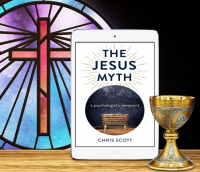

I call myself a pacifist. I haven’t always done so and I sometimes hesitate to if I think I might be misunderstood. I am a pacifist – by which I mean that I try to play my part in making peace by nonviolent means.
Perhaps my pacifism hasn’t yet been fully tested. I haven’t
been a soldier or a resident of a country invaded by another nor
been forced in to the military through conscription. Nevertheless,
as a resident of a country which drops bombs on other countries,
sells weapons to governments engaged in human rights abuse
and is complicit in climate change – causing perhaps the largest
process of global violence imaginable – I feel a responsibility to
speak out and do what I can to work for peace.
I am a pacifist first and foremost because of a profound
physiological, psychological and spiritual sense that I couldn’t
kill another person and that to inflict pain on others is wrong.
Different cultures have used different words and explanations
for this feeling. Within many world religions and cultures there
is a group that feels likewise. In Britain – where I live and grew
up – perhaps the best known is the Quaker community of which
I am part. I declare my background from the start, and have no
doubt my outlook has been shaped by my experience of this
community. But true to the non-doctrinal, non-creedal tradition
it is also a position I have come to myself.
The word pacifist is not widely understood. Culture shapes
language, which in turn shapes the way we think and the
decisions we make. That we speak of ‘nonviolence’ reveals that
within our culture, violence is the norm. We do not refer to war
as ‘nonpeace’.
We do, however, have the word pacifist. Even that, though,
has come to be most often defined as what it is not – as a refusal to
engage in violence. Sometimes it is intentionally misconstrued as
a synonym for passivity, or even pacification. At its root though,
pacifism means the act of making peace. As such it describes an
active process.
Whilst blurring the meaning of pacifism is sometimes the
intention of advocates of war, it does touch on a historic tension, still reflected today in movements for peace. As nonviolence
educator David Gee (no relation) explains, we find the root of the
English word ‘peace’ in the Latin word pax meaning agreement
– in the sense of the word pact – and the Indo-European pag
meaning ‘fetter’ or ‘chain’. Those with an interest in classical
history will be familiar with the ‘Pax Romana’ – an imperial
peace without justice imposed by Rome militarily on its empire.
That is not the only way to understand the word though:
Also translated into English as ‘peace’ is the Hebrew word
shalom and the Arabic salaam. This more spiritual sense denotes
‘wholeness, abundance, health, wellbeing – the integrity of
our common aliveness’. Understood this way a commitment to
peace encompasses a commitment to equality, economic justice
and environmental protection. In contrast the origin of the word
violence is to ‘break’.
The introduction of the word ‘pacifist’ to the English language
is often traced to a speech about a system of international
arbitration to resolve conflicts given to the universal peace
congress of 1910 which spoke of the need for a word to denote
work for a positive peace – rather than mere ‘anti-war-ism’. In the
shadow of the First World War though, popular understanding
of the word narrowed to mean mere non-participation in war –
the exact definition it had been coined as an alternative to.

I often wish we had a better word. In an online video titled
‘Why I Am Not a Pacifist’ in the QuakerSpeak series, Kristina
Keefe-Perry shares how the word ‘pacifist’ is too small for what
she would like it to mean, falling short of the revolutionary
possibilities implied in Jesus’ teaching against the multifaceted
violence of poverty and greed, as well as war. ‘Shalomist’ and
‘pacificist’ are amongst the words used to convey shades of
variety in approaches to work for peace. Rather than attempting
to create a new word though, this book is an attempt to reclaim
the word we’ve got.
When I talk about pacifism I am talking about
a commitment to not killing, not supporting killing and trying
to undo the systems and structures that lead to killing. It doesn’t
simply mean going on peace protests every so often, then getting
on with business as usual in-between. Even if our actions are
imperfect in the present, we can each have a role creating the
conditions where peace can thrive. So too it is a commitment to
working for justice. Until that time comes we could probably
think of the absence of fighting simply as a ‘truce’ rather than
true peace.
This is a pacifism rooted in spirituality, reflected in the words
of the best known early Quaker George Fox who declared that
he ‘lived in the virtue of that life and power that takes away
the occasion of all wars’.6
Already in prison for what we might
nowadays call acts of nonviolent civil disobedience, Fox’s
incarceration was extended for refusing to enlist in the army.
In so doing he acted as an inspiration, pattern and example
to thousands of Quakers – amongst many others – who have
worked, struggled and sometimes suffered for their deeply held
conviction that it is wrong to kill.

BUY NOW
Categories:
0 comments on this article







